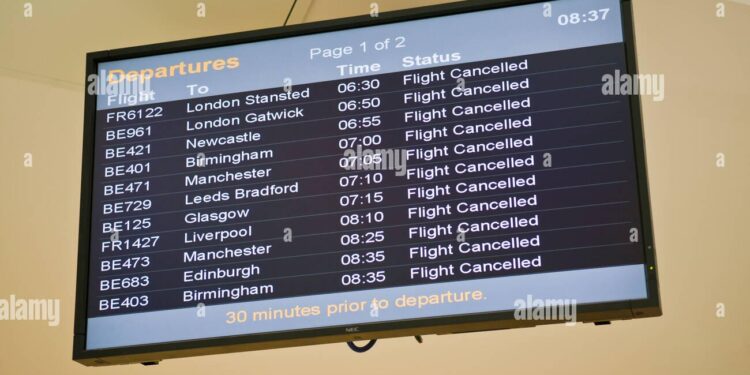Dozens of flights were canceled at Amsterdam’s Schiphol Airport Monday as a severe storm disrupted air traffic across the Netherlands. The unexpected weather conditions forced airlines to halt operations, causing significant delays and inconvenience for travelers. Airport authorities and airlines are working to manage the situation and minimize further disruptions as the storm continues to impact the region.
Flights Disrupted at Schiphol Airport as Severe Storm Impacts Operations
The severe storm that swept across the Netherlands on Sunday led to significant disruptions at Schiphol Airport, one of Europe’s busiest travel hubs. Over thirty flights were canceled while many others faced considerable delays as airport authorities contended with heavy rain, strong winds, and reduced visibility. Passengers were advised to check real-time flight updates on official platforms and prepare for extended waiting periods. Ground operations, including baggage handling and aircraft boarding, were severely hampered due to safety protocols activated during the peak of the storm.
In addition to cancellations, several airlines announced temporary changes to their schedules, affecting both domestic and international routes. Schiphol’s management confirmed the following impacts:
- Flight cancellations: 32 flights across major carriers
- Delays: 45 flights delayed by an average of 2 hours
- Operational adjustments: Reduced runway availability for safe landings and take-offs
| Airline | Canceled Flights | Average Delay |
|---|---|---|
| KLM | 15 | 1.8 hrs |
| Transavia | 8 | 2.2 hrs |
| EasyJet | 5 | 2.5 hrs |
| Lufthansa | 4 | 1.7 hrs |
Passenger Experience and Airline Responses Amid Cancellations and Delays
Passengers caught in the chaos at Schiphol airport voiced frustration and concern as scores of flights were abruptly canceled or delayed. Many reported long queues at customer service counters and uncertainty regarding rebooking options. Families with young children and elderly travelers faced additional stress, seeking immediate solutions amid the disruption. Social media buzzed with firsthand accounts, highlighting the challenges of navigating a sudden travel upheaval during peak hours. Airlines urged travelers to stay informed via official channels and to arrive early, amid fears of further complications due to the persistent stormy conditions affecting the region.
In response, several airlines implemented contingency plans designed to mitigate inconvenience. These measures included:
- Rapid rebooking services via mobile apps and dedicated hotline support
- Provision of meal vouchers to passengers facing extended delays
- Accommodation arrangements for those stranded overnight
- Enhanced communication efforts including real-time updates on flight status
To further illustrate the impact, the table below summarizes the approximate scale of cancellations and delays reported by key airlines operating at Schiphol:
| Airline | Flights Canceled | Average Delay |
|---|---|---|
| KLM | 22 | 90 mins |
| Transavia | 10 | 85 mins |
| EasyJet | 8 | 70 mins |
| Lufthansa | 5 | 60 mins |
Safety Measures and Future Preparedness Strategies for Weather-Related Flight Interruptions
In light of the recent cancellations at Schiphol Airport caused by severe storm conditions, authorities and airlines are prioritizing enhanced safety protocols to protect passengers and staff. These measures include real-time weather monitoring systems linked directly to flight operation centers, mandatory crew briefings on adverse weather procedures, and stricter criteria for flight delays or cancellations based on wind speed and visibility thresholds. Airports are also investing in upgraded runway drainage systems and stronger infrastructure to mitigate storm impact and prevent operational hazards.
Looking ahead, future preparedness strategies emphasize a combination of technological innovation and improved communication channels. Airlines and airports are collaborating to deploy advanced AI-powered predictive tools that forecast weather disruptions with higher accuracy, allowing for proactive scheduling adjustments. Additionally, streamlined passenger communication via mobile apps ensures timely alerts and alternative travel options. Below is a summary of key strategies being implemented:
- AI-driven weather forecasting for early disruption detection
- Automated flight rescheduling to minimize passenger inconvenience
- Enhanced staff training focused on storm-specific safety procedures
- Improved airport infrastructure aimed at withstanding extreme weather
- Multi-channel communication platforms for timely updates
| Strategy | Expected Benefit |
|---|---|
| AI Flight Disruption Alerts | Reduce last-minute cancellations |
| Infrastructure Upgrades | Maintain airport operations during storms |
| Real-Time Passenger Communication | Improve customer experience and trust |
Wrapping Up
As the situation at Schiphol Airport continues to develop, travelers are advised to stay updated through official airline channels and airport announcements. Authorities are closely monitoring weather conditions and working to resume normal operations as swiftly and safely as possible. Passengers affected by the cancellations are urged to contact their carriers for assistance and rebooking options. Further updates will be provided as more information becomes available.
















